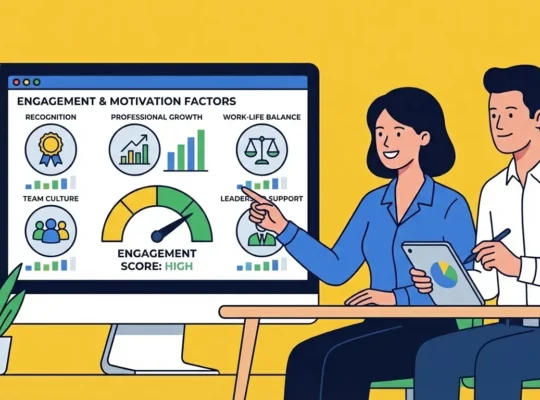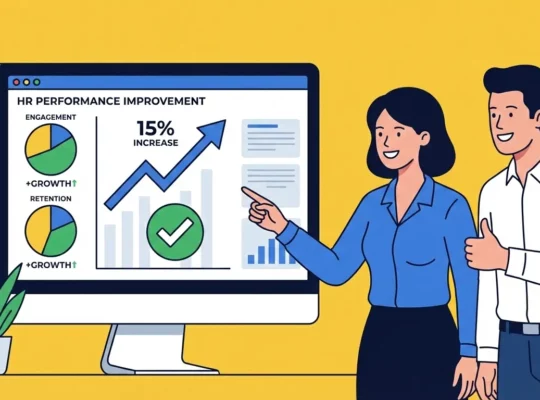Development goals for a manager are essential for fostering effective leadership and driving organizational success. At review.jobs, we recognize the critical role that managers play in shaping workplace culture, enhancing employee satisfaction, and achieving business objectives. This article aims to provide practical tips for managers to improve their skills and highlight the numerous benefits of great management. Whether you’re a seasoned leader or an aspiring manager, these development goals will help you foster a positive work environment and drive your team toward success.
In this comprehensive guide, we’ll explore why being a great manager is important and beneficial, followed by 25 essential tips to become a better manager. We will also compare the characteristics and consequences of good and bad managers to underscore the impact of effective management on organizational success. Let’s delve into the strategies and benefits of great management.
Why It Is Important and Beneficial to Be a Great Manager
Importance of Great Management
Great management is the cornerstone of any successful organization. Effective managers drive team and organizational success by:
| Aspect | Description |
| Enhancing employee satisfaction and engagement | Happy and engaged employees are more productive and loyal. |
| Promoting a positive work environment | A healthy workplace culture fosters collaboration and innovation. |
| Fostering innovation and productivity | Encouraging creativity and efficiency leads to better results. |
Effective team management ensures that employees are motivated, aligned with organizational goals, and equipped to perform their best. Managers who focus on their development goals can significantly impact their team’s performance and overall business success.
Benefits of Being a Great Manager
Being a great manager offers numerous benefits, including:
| Benefit | Description |
| Improved employee retention | Satisfied employees are less likely to leave, reducing turnover rates. |
| Increased team productivity | Clear goals and efficient processes boost performance. |
| Enhanced team morale | A supportive environment increases motivation and engagement. |
| Better communication and collaboration | Open lines of communication minimize conflicts and misunderstandings. |
| Higher employee satisfaction | Recognizing and appreciating contributions leads to greater job satisfaction. |
| Greater innovation and creativity | Supporting new ideas fosters a culture of innovation. |
| Effective leadership and decision-making | Strong leadership skills enable better decision-making. |
| Healthier work-life balance for team members | Promoting balance reduces stress and burnout. |
| Stronger professional relationships | Trust and respect among team members improve collaboration. |
Focusing on leadership development goals not only benefits managers but also enhances the overall effectiveness and success of the organization.
Top 25 Tips to Be a Better Manager
Organize Productive Meetings
Organizing productive meetings is a critical development goal for a manager. Effective meetings can drive progress and ensure team alignment. Here are some tips to achieve this:
- Set clear goals for each meeting: Define the purpose and desired outcomes.
- Establish regular meeting schedules: Consistency helps in maintaining progress.
- Take detailed notes and specify action plans: Document discussions and assign responsibilities.
Organizing productive meetings can significantly enhance managerial effectiveness. Setting clear goals, establishing regular schedules, and taking detailed notes are essential steps in ensuring that meetings are efficient and productive. This approach helps managers align their teams with organizational objectives and track progress effectively.
Practice Active Listening
Active listening is essential for understanding and addressing employee concerns. Managers can enhance their listening skills by focusing on the following:
- Be receptive to non-verbal cues: Pay attention to body language and facial expressions.
- Understand and address employee concerns: Show empathy and provide support.
- Paraphrase and ask clarifying questions: Ensure clarity and comprehension.
Practicing active listening helps in building trust and fostering effective communication within the team. By being attentive to non-verbal cues, understanding concerns, and asking clarifying questions, managers can create a supportive environment where employees feel heard and valued.
Encourage Employee Development
Supporting continuous learning and skill development is a vital development goal for a manager. Here’s how to encourage employee growth:
- Support continuous learning and skill development: Provide access to training and development programs.
- Provide opportunities for leadership roles: Encourage employees to take on new responsibilities.
- Align employee growth with company goals: Ensure development efforts contribute to organizational success.
Encouraging employee development is crucial for fostering a culture of continuous improvement. By offering opportunities for skill enhancement and aligning growth with company goals, managers can help employees achieve their full potential and contribute to the organization’s success.
Boost Team Productivity
Boosting team productivity requires regular monitoring and clear goal-setting. Managers can implement these strategies:
- Regularly review and track team progress: Use metrics to measure performance.
- Set clear productivity goals and facilitate status meetings: Keep the team focused and accountable.
- Celebrate employees’ efforts: Recognize and reward achievements to motivate the team.
Boosting team productivity involves setting clear performance goals and regularly tracking progress. Celebrating employee efforts and facilitating status meetings are essential strategies for maintaining high productivity levels and ensuring team members stay motivated and engaged.
Celebrate Employees’ Efforts
Recognizing and celebrating employees’ efforts is crucial for maintaining high morale and motivation. Managers should:
- Acknowledge and reward achievements publicly: Use company-wide meetings or newsletters.
- Hold company-wide appreciation meetings: Create a culture of recognition and gratitude.
Celebrating employees’ efforts fosters a positive work environment. Public recognition and appreciation meetings can boost morale, increase engagement, and create a supportive culture where employees feel valued and motivated to perform their best.
Develop Networking Skills
Building strong professional relationships is an essential development goal for a manager. Networking can lead to new opportunities and collaborations. Consider these tips:
- Build strong professional relationships: Connect with colleagues, industry peers, and stakeholders.
- Engage in networking activities: Attend industry events and join professional organizations.
Developing networking skills is vital for professional growth. By building strong relationships and engaging in networking activities, managers can expand their professional networks, gain new insights, and explore opportunities for collaboration and career advancement.
Increase Retention Rates
Retaining top talent is critical for organizational success. Managers can improve retention rates by focusing on:
- Provide regular, positive, and constructive feedback: Help employees grow and develop.
- Recognize and reward employee contributions: Show appreciation for hard work and achievements.
Increasing retention rates involves providing constructive feedback and recognizing employee contributions. Regular feedback and appreciation can enhance job satisfaction, reduce turnover, and ensure that valuable team members remain committed to the organization.
Foster a Respectable Work Environment
Creating a respectful and inclusive work environment is a key development goal for a manager. This can be achieved by:
- Recognize contributions and encourage collaboration: Foster teamwork and mutual respect.
- Create a culture of respect and trust: Address conflicts promptly and fairly.
Fostering a respectable work environment is essential for building team morale. Recognizing contributions, encouraging collaboration, and creating a culture of respect and trust can enhance employee engagement and create a supportive workplace.
Be a Mentor and Coach
Providing guidance and support is essential for employee development. Managers should:
- Provide guidance and support for employee growth: Offer advice and mentorship.
- Help employees set and achieve career goals: Align individual aspirations with company objectives.
Being a mentor and coach is crucial for employee development. By offering guidance and helping employees set and achieve career goals, managers can support their team’s professional growth and foster a culture of continuous learning.
Improve Work-Life Balance
Promoting work-life balance is crucial for employee well-being and productivity. Managers can:
- Set boundaries between professional and personal life: Encourage employees to disconnect after work hours.
- Promote well-being and happiness: Support initiatives that enhance work-life balance.
Improving work-life balance is a critical development goal for a manager. Encouraging employees to maintain boundaries and promoting well-being can lead to higher job satisfaction and overall happiness, reducing stress and burnout.
Enhance Adaptability
Adaptability is a vital skill for managers in a constantly changing work environment. Managers should:
- Be flexible and open to change: Embrace new ideas and approaches.
- Manage transitions smoothly: Support the team during organizational changes.
Enhancing adaptability helps managers navigate organizational shifts and unexpected challenges effectively. Being flexible and open to change ensures that managers and their teams can respond proactively to new opportunities and demands.
Improve Time Management Skills
Effective time management is essential for productivity. Managers can improve their time management skills by:
- Prioritize tasks and manage time effectively: Focus on high-impact activities.
- Share time management strategies with the team: Help employees optimize their work processes.
Improving time management skills is crucial for achieving performance goals. By prioritizing tasks and sharing effective time management strategies, managers can enhance their productivity and that of their teams.
Manage Stress Effectively
Stress management is crucial for maintaining a positive and productive work environment. Managers can:
- Develop strategies to stay calm under pressure: Practice mindfulness and relaxation techniques.
- Encourage healthy stress management practices: Promote a supportive and balanced workplace.
Managing stress effectively is an essential development goal for a manager. By developing strategies to stay calm and promoting healthy stress management practices, managers can create a positive work environment and maintain high performance levels.
Reduce Micromanaging and Increase Delegation
Delegation is essential for building trust and efficiency. Managers should:
- Delegate tasks to build trust and efficiency: Empower employees by giving them ownership of their work.
- Avoid micromanaging to foster autonomy: Focus on outcomes rather than controlling every detail.
Reducing micromanaging and increasing delegation helps managers foster autonomy and confidence within their teams. By empowering employees to take ownership of their work, managers can focus on higher-level tasks and improve overall team efficiency.
Develop Soft Skills
Soft skills are critical for effective leadership and team management. Managers should focus on:
- Enhance communication, empathy, and decision-making skills: Improve interpersonal interactions.
- Foster creativity and critical thinking: Encourage innovative problem-solving approaches.
Developing soft skills is a vital development goal for a manager. Enhancing communication, empathy, and decision-making abilities can improve leadership effectiveness and foster a collaborative and innovative team environment.
Improve Employee Onboarding
Effective onboarding is crucial for new employees’ success. Managers should:
- Create standardized onboarding materials: Ensure consistency in training and orientation.
- Conduct feedback surveys: Gather input from new hires to improve the process.
Improving employee onboarding helps new team members feel welcome and supported, contributing to higher retention rates and better performance from the start.
Create a Plan for Business Expansion
Strategic planning is vital for growth. Managers should:
- Develop detailed project plans for new initiatives: Outline steps and timelines.
- Align expansion with company goals: Ensure new projects support overall objectives.
Creating a plan for business expansion helps managers guide their teams through growth phases and ensure organizational success.
Clarify Job Descriptions
Clear role definitions are essential for performance. Managers should:
- Audit and update job descriptions regularly: Reflect current responsibilities and expectations.
- Ensure role expectations are clear: Communicate changes effectively.
Clarifying job descriptions ensures that employees understand their roles, leading to better performance and job satisfaction.
Decrease Time Spent in Meetings
Efficient meetings save time. Managers should:
- Implement standardized meeting agendas: Focus discussions on key topics.
- Schedule meetings only when necessary: Avoid unnecessary interruptions.
Decreasing time spent in meetings allows managers and employees to focus on productive work.
Build a Dynamic Team
A cohesive team drives success. Managers should:
- Model collaboration, innovation, and communication: Set an example for team behavior.
- Encourage flexibility and responsiveness: Adapt to changing needs and opportunities.
Building a dynamic team enhances team cohesion and performance.
Schedule Team-Building Activities
Team-building activities strengthen relationships. Managers should:
- Plan regular team-building events: Encourage participation and collaboration.
- Strengthen relationships and improve cohesion: Foster a sense of unity.
Scheduling team-building activities boosts team morale and productivity.
Increase Employee Engagement
Engaged employees are more productive. Managers should:
- Introduce rewards programs for top performers: Recognize and motivate high achievers.
- Provide development opportunities for struggling employees: Support growth and improvement.
Increasing employee engagement creates a motivating work environment.
Improve Presentation Skills
Effective presentations are key for communication. Managers should:
- Learn best practices for meetings and presentations: Enhance delivery and engagement.
- Practice and seek feedback on presentation skills: Continuously improve.
Improving presentation skills enhances communication effectiveness.
Hold Regular Check-In Meetings
Regular check-ins keep teams aligned. Managers should:
- Set up regular meetings with team members: Review performance and address concerns.
- Maintain open lines of communication: Ensure alignment and progress.
Holding regular check-in meetings supports ongoing performance management.
Gain Leadership Certifications
Certifications enhance leadership skills. Managers should:
- Complete leadership development courses: Gain new insights and techniques.
- Earn certifications to enhance skills: Demonstrate commitment to growth.
Gaining leadership certifications supports professional development and effectiveness.
Comparing Good Managers vs. Bad Managers
Characteristics of Good Managers
Good managers exhibit qualities that drive success:
| Characteristic | Description |
| Clear and effective communication | Ensures understanding and alignment. |
| Strong leadership and decision-making skills | Guides teams effectively. |
| Empathy and understanding towards employees | Builds trust and rapport. |
| Ability to inspire and motivate teams | Encourages high performance. |
| Focus on continuous improvement and development | Supports growth and innovation. |
Characteristics of Bad Managers
Bad managers display traits that hinder performance:
| Characteristic | Description |
| Poor communication and unclear expectations | Leads to misunderstandings. |
| Lack of leadership and indecisiveness | Creates confusion and inefficiency. |
| Disregard for employee well-being and feedback | Erodes trust and morale. |
| Inability to motivate and engage the team | Reduces productivity. |
| Resistance to change and lack of innovation | Stagnates growth. |
Consequences of Good Management
Effective management leads to positive outcomes:
| Consequence | Description |
| High employee satisfaction and retention | Reduces turnover and enhances loyalty. |
| Increased productivity and efficiency | Achieves organizational goals. |
| Positive work environment and culture | Fosters collaboration and innovation. |
| Strong team collaboration and morale | Drives high performance. |
| Organizational growth and success | Ensures long-term viability. |
Consequences of Bad Management
Poor management results in negative effects:
| Consequence | Description |
| High employee turnover and dissatisfaction | Increases hiring and training costs. |
| Decreased productivity and engagement | Hinders goal achievement. |
| Negative work environment and culture | Discourages collaboration and creativity. |
| Poor team collaboration and morale | Reduces effectiveness. |
| Organizational stagnation and decline | Threatens long-term success. |
Effective management and leadership are crucial for the success of any organization. By focusing on development goals for a manager, individuals can enhance their skills, improve team performance, and foster a positive work environment. We encourage all managers to implement the tips provided and experience the benefits of great management.





